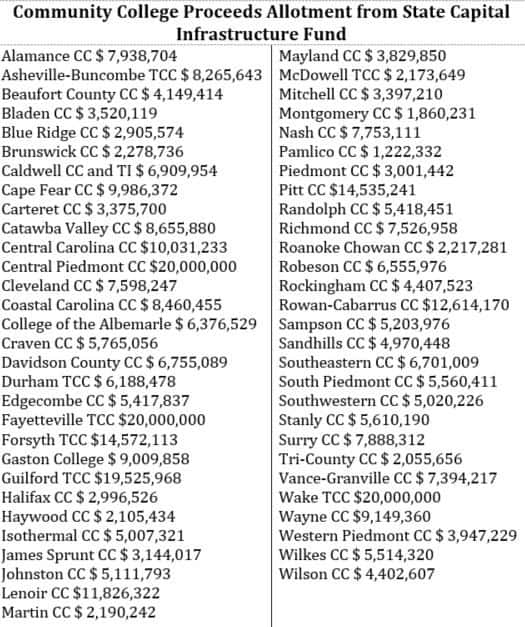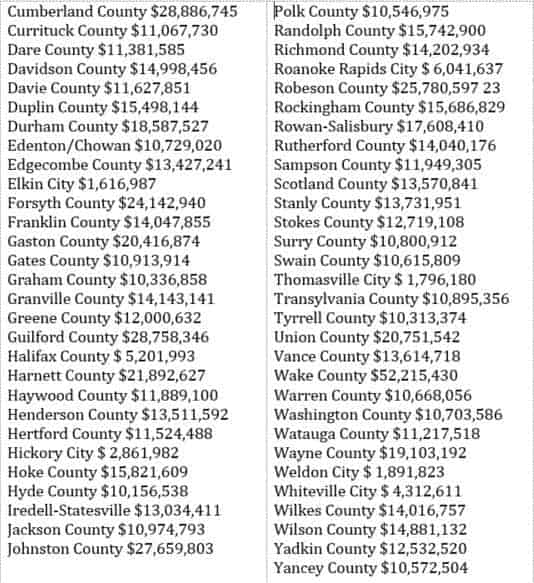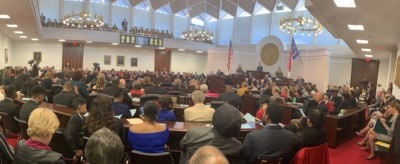

Both the state House and Senate cast their final votes in favor of North Carolina’s budget for the next two years today, setting up a possible showdown between the Republican-led legislature and Democratic Gov. Roy Cooper. Once he gets the budget, Cooper has 10 days to sign, veto, or do nothing.
The budget, which amounts to $14.2 billion for education — 57% of the total budget and $500 million more than last year according to Rep. Craig Horn, R-Union, a chair of the House education appropriations committee — merges many of the separate proposals from both the House and the Senate while leaving out some items that received both positive and negative public response. At the same time, in some areas of education, the two-year plan falls short of the mark Cooper tried to hit in his budget proposal.
One area of contention between the General Assembly and Gov. Cooper is in how to pay for school construction and repair. The House had a plan to put a school construction bond on the ballot — though it wasn’t in their budget proposal — while the Senate favored a pay-as-you-go plan that utilized money that would come from a group of different funds. Ultimately, the Senate won out. The final budget compromise will provide about $4.4 billion over 10 years for K-12 school construction and repair. Of that, $1.5 billion will come from the State Capital and Infrastructure Fund, $1 billion from the Public School Capital Fund, and $1.9 billion in needs-based capital funding. House Speaker Tim Moore, R-Cleveland, said on the House floor Thursday that he preferred a bond but went along with the Senate proposal because it included a $300 million injection into the State Capital and Infrastructure Fund.
Cooper’s office sent out a statement on the budget Tuesday, which included criticism of the construction plan, particularly the use of the State Capital and Infrastructure Fund.
“It includes a slush fund that promises projects that may never be built rather than using a school bond at today’s historically low interest rates to help build new schools responsibly,” the statement said.
A statement later in the week from Senate Deputy President Pro Tempore Ralph Hise, R-Mitchell, pushed back on that sentiment, saying that the construction money that comes through the State Capital and Infrastructure Fund has a set amount of funding determined by a formula that takes into account enrollment and county wealth when allocating money to districts for construction. The statement said that is the exact same way money would be allocated with a bond.


County Allotments


On teacher pay, the compromise budget includes an average 3.9% pay raise over the biennium, but all new raises go to teachers with 16 years of experience or more. Teachers with fewer than 16 years simply get their planned step increases.
That proposal came in for criticism Wednesday by Rep. Darren Jackson, D-Wake, the House’s Democratic leader, who noted that South Carolina, which has fewer teachers, is spending more money on teacher pay increases in its budget than North Carolina does. He also said that Cooper’s proposed $579 million infusion to teacher pay dwarfs the compromise budget’s $124 million.
Cooper’s plan would have included an average 9.1% increase for teachers, as well as the restoration of master’s pay.
That same statement from Cooper’s office pointed at the compromise budget’s teacher pay proposal as being inadequate.
“From what we’ve seen, this is a bad budget that has the wrong priorities,” the statement said. “It spends more on corporate tax breaks instead of significantly higher teacher pay.”
There was some common ground on master’s pay between the House and Cooper. The House’s original budget included master’s pay for teachers with advanced degrees, something that the General Assembly did away with in 2013 making North Carolina the first state in the country to get rid of extra pay for advanced degrees. But this provision was left out of the compromise budget.
On principal pay, Cooper and the House, again, had some similarities.
Cooper’s budget included about $31 million extra over two years for principal salary changes, and his plan also restructured the principal pay schedule to include years of experience as a factor. Previously, principals were paid based on the size of their school and school growth alone.
The House budget included an extra $48 million over two years to increase principal salaries. It also changed the structure of the principal salary schedule, keeping the size of school and school growth as factors, but also adding in years of experience to principals’ base salary.
The principal pay raise under the compromise budget amounts to an average 6.2% increase in pay for principals but does not include the major structural changes that Cooper and the House originally wanted. It provides $15 million extra in both years for the raises.
But Medicaid expansion has been the real fulcrum of disagreement between Cooper and the General Assembly. Simply put: Cooper wants it, and legislative Republicans don’t.
Shortly before the reveal of the legislative budget compromise, Cooper’s office said the following:
“Governor Cooper and Democratic leaders again made clear to Republican leaders that they oppose corporate tax cuts, unaccountable school vouchers and the SCIF slush fund and said that any budget compromise has to include discussion of Medicaid expansion, a school and infrastructure bond and significantly higher teacher salaries. Governor Cooper indicated today that these items are negotiable, but Republican leaders have nearly completed their budget and are unwilling to discuss all of these important priorities that benefit our state.”
Legislative Republicans say that despite what Cooper says, the real sticking point is Medicaid and that they have offered a compromise in that area. They have agreed to a special session in which health care — including Medicaid expansion — could be explored in-depth. According to them, this wasn’t good enough for Cooper.
“We have offered a compromise to Governor Cooper on his number one priority, Medicaid expansion,” said Senate President Pro Tempore Phil Berger, R-Rockingham, in a press release. “He should not prevent the largest pay increase for state employees in more than a decade, teacher pay raises, and health care for disabled individuals just because of a single policy disagreement.”
Meanwhile, a lot of proposals that were both vilified and praised in the Senate and House budgets failed to make it into the final budget compromise.
The House budget would have tweaked the formula for the school performance grades, making them a 51/49% split in favor of academic achievement over academic growth. Currently, the formula is 80/20 in favor of academic achievement. The budget compromise keeps it that way.
The House budget also included a controversial provision that would establish a virtual early-learning pilot program. That also failed to make it into the final budget compromise.
The House had a provision that some saw as a punitive measure against teachers who rallied in May against Republican education proposals. That measure would have prevented teachers from taking personal leave unless a substitute is available, but it was not in the budget compromise. In advance of the teacher rally, large numbers of teachers had been asking off from work to attend.
The Senate spending plan included money to hire an additional 100 school psychologists in the state in an effort to make sure every district has at least one. That proposal was not in the final budget compromise.
The Senate budget eliminated 13 vacant positions at the state Department of Public Instruction. These cuts were not in the final budget compromise.
The final budget compromise also got rid of a Senate budget provision that would prevent local school boards from suing their county commissioners for capital funding.
Finally, absent from the compromise budget was a provision from the Senate budget that would have cut the supplemental funding of Cooperative Innovative High Schools — including early college high schools. Essentially, the Senate provision would have phased out supplemental funding for all preexisting Cooperative Innovative High Schools and limited it to the first three years of life for any new Cooperative Innovative High Schools.
The compromise budget did, however, include a provision restricting the State Board of Education from approving more than four new Cooperative Innovative High Schools a year if those schools are seeking the supplemental funding. Additionally, the opening of any new approved schools is contingent on the General Assembly appropriating additional funds for them within one calendar year. The school cannot open unless that contingency is fulfilled, and if it’s not, the school can resubmit a revised application — ostensibly without a request for the supplemental funds. This new law would take effect for schools applying to open in the 2020-21 school year.


